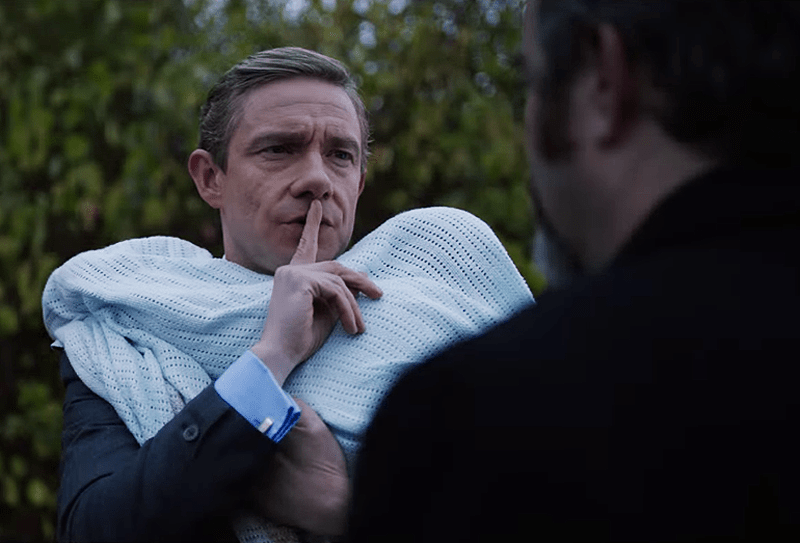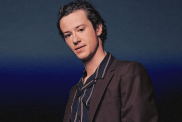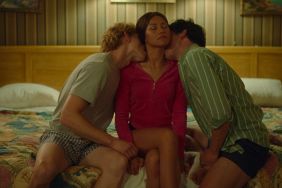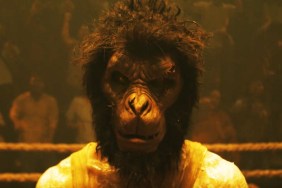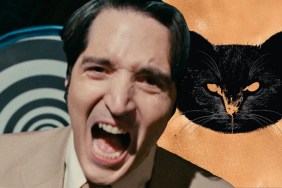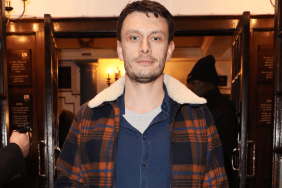IFC Films provided ComingSoon.net with the chance for an exclusive 1:1 interview with actor Martin Freeman (Sherlock, The Hobbit trilogy) about his new horror anthology film Ghost Stories, which is now playing in select theaters and on VOD. Check out our interview below in which we discuss the old Amicus horror films of the ’70s that inspired Ghost Stories, as well as the continued role of Freeman’s Black Panther character Everett Ross in the ongoing Marvel Cinematic Universe!
Experience three spine-tingling tales of terror to haunt your dreams. A debunker of all things paranormal, Professor Phillip Goodman (Andy Nyman) has devoted his life to exposing phony psychics and fraudulent supernatural shenanigans on his own television show. His skepticism is put to the test, however, when he receives a file of three chilling, inexplicable cases: a night watchman (Paul Whitehouse) haunted by disturbing visions as he patrols an abandoned asylum; an edgy young man (Black Mirror’s Alex Lawther) involved in a hellish car accident deep in the woods; and a wealthy former banker (Black Panther’s Martin Freeman) visited by the poltergeist spirit of his unborn child. Even scarier: each of the these macabre stories seems to have a sinister connection to Professor Goodman’s own life. Will they make a believer of him yet?
Written and directed by Jeremy Dyson and Andy Nyman from their own stage play, Ghost Stories is now playing in select theaters and on VOD through IFC Midnight.
ComingSoon.net: I love the old Hammer movies and Amicus anthologies so much, so when I saw “Ghost Stories” it was right in my wheelhouse. Was that part of what attracted you to the project?
Martin Freeman: Definitely, yeah, because I was born in ’71, so by the time I was watching horror on TV a lot of it was that period of Hammer and Amicus films, those anthology stories with three or four stories in one. As a kid that was part of our upbringing in the UK, in a way. It reminded me a bit of those things — without trying to sound too salesman-y about it — in a unique way. It’s an original film. It’s not pretending to be Peter Cushing or anything, but it obviously references that period of British filmmaking.
CS: It is definitely a contemporary movie, it’s not trying to be a pastiche.
Freeman: No, not at all, not in any way. It’s just using some of the mechanisms, but it’s not camp. It’s not ironic. It’s hopefully properly scary.
CS: Definitely. Do you have any particular favorites from that era?
Freeman: I do like that… is it called “Asylum”?
CS: Yeah! The one with the little robot that kills Herbert Lom.
Freeman: Love it. I love that one. I love “Dr. Terror” from ’65, the one in the first class compartment.
CS: With Donald Sutherland, and Christopher Lee vs that severed hand.
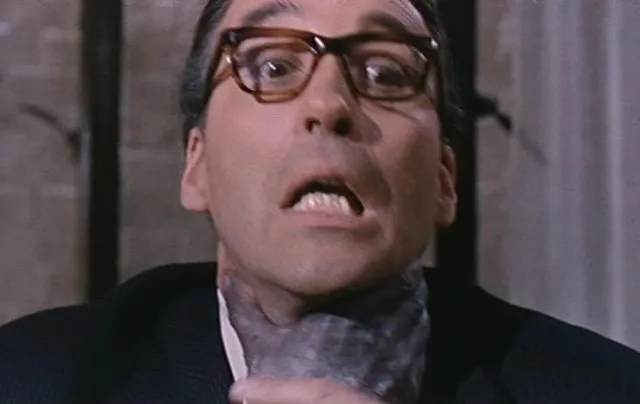
Freeman: I love the hand. In fact, the last suit that I got made was based in my head on the very dark blue suit that Christopher Lee wears when he’s fighting that hand. He’s wearing this beautiful three-piece serge raw suit. Everything, though, from “Hound of the Baskervilles” to when Hammer made the Frankensteins, even though they were different formats, that was what my generation grew up with in my country. And they were already old by the time I’d seen them in the early ’80s. They were already kind of old, but I loved them.
CS: Did you and Andy and Jeremy ever reference any of them on set?
Freeman: Never on set, but it’s already implicit in the screenplay. Not because of the content but the mechanism, the three or four stories and the sort of twisty stuff that happens at the end. I think we were always good at the psychological thriller in the UK. We like a little bit of messing with your head, and I don’t know if that’s a British thing or not, I’m sure that’s universal. That disturbing stuff that wasn’t about monsters, where your greatest fear would be yourself or your own head, a fear of madness, something like that. It was always strong. We never consciously referenced anything on set, no.
CS: The most fascinating part of “Ghost Stories” is the third act, because the first two stories are proper scary and then when you get to the third act it becomes a more cerebral, almost Charlie Kaufman-esque internal deep-dive.
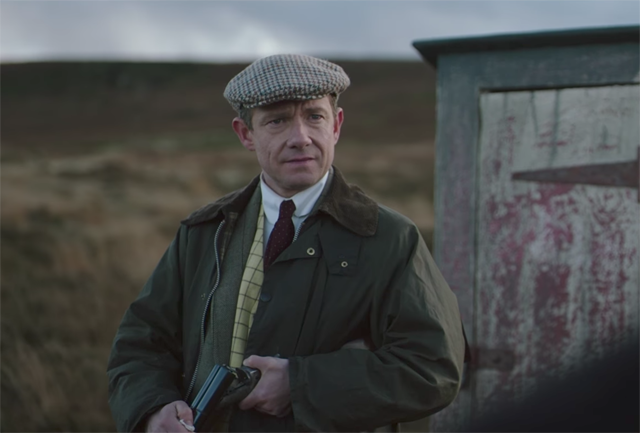
Freeman: It does slightly different things than just be a genre film, I guess. It’s very thoughtful, and quite provoking. And disturbing. When you see the fruition at the end, it’s certainly one of my worst fears. It’s horrible, terrifying and it’s a real thing. But all the things that are fueling him which is mainly guilt over things he did and didn’t do, shame, breaking away from his father and not doing what he could have done for his school friend. Them’s are real things. I like the fact that your sympathy is with different people.
CS: You also do the bit in the make-up. What were some of the challenges of doing the Scottish accent and everything?
Freeman: I just knew he was an old old man, and that was one of the reasons I wanted to do the job. Andy sent me an email with the screenplay saying it’s got a bit of “Sleuth” in it. “Sleuth” was a film I used to watch on a daily basis as a kid, before I knew I wanted to be an actor I think I wanted to be Michael Caine. That disguise-y element in “Sleuth” and sort of playing with the audience and the game playing, I just love it. It made me want to be an actor. So as soon as he mentioned that in his letter I knew I wanted to work on this. As an actor its license to really have fun, and when that reveal happens it’s a heightened, theatrical character that comes out.
CS: In a very surreal setting.
Freeman: Yeah. And he becomes this weird sort of MC… you know, devil sort of character. Showing him the mirror of his own horror, and really loving that. Having real pleasure in someone else’s discomfort, which is really fun to play.
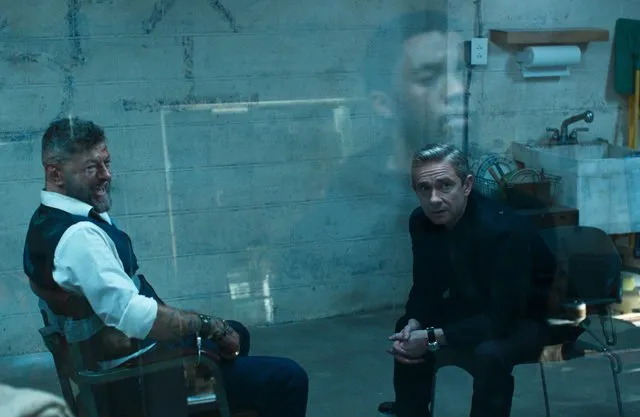
CS: We’re still coming off the insane juggernaut that was “Black Panther.” Did you ever imagine that it would be that huge?
Freeman: I did imagine it would be big, yeah. Because A) It’s a Marvel film and they’re quite successful, and B) because you know there’s a whole swath of people hungry for that film, for various reasons. We hoped it would resonate with people, but to the extent that it has was a delightful bonus. People have seen it multiple times.
CS: Oh yeah, people buying out blocks of theaters. And just in terms of Everett Ross, do you see him moving forward as kind of the Felix Leiter of the “Black Panther” franchise, or more of an overall utility player in the larger Marvel Universe?
Freeman: That’s interesting, I don’t know if he would be the Felix Leiter. (laughs) He’s got more to come, I believe. It’s my understanding that there’s more Everett Ross to come, which I’m very happy about because it was great fun. I like his journey from when you see him in “Civil War” as a small part, an introduction. He’s the man, he’s CIA. He’s very establishment, and you see a different side of him in “Black Panther” and I like it. Everyone likes journeys, and people like to see change in characters, to go from A to B and you see what happens along the way, and I think Everett Ross has got a really good little tangent.
CS: That’s one of the brilliant things that Marvel Comics has always done since the beginning, taking characters and switching them up. Good guys become bad guys, bad guys become good guys. Your character seems very flexible in that you could imagine him as an antagonist to the heroes just as easily.
Freeman: Yeah yeah yeah! Well I think he’s a realist. In the job that he’s in, as far as he sees it, he’s protecting his country. He’s trying to protect the world from people with horrible weapons of mass destruction and rogue governments. He would see his job as an American as helping make the world a slightly safer place, and I think that’s an honorable position to be in. That’s what I see him as being. Once you are the most powerful country in the world, whoever that has been throughout history, you have to do some not very nice things in order to sustain that, and you have to make decisions that are not very nice to have to make. So he’s in that position. He’s not groovy, he’s not hip. He is “the man” still, but he’s definitely got a code of honor and a moral compass.
CS: There was an interesting interpretation I saw in a few places after the movie came out. I don’t agree with this, but I wanted to know what you thought of it. There were people saying that “Black Panther” was offensive that the black heroes would side with a white CIA agent to take down a black revolutionary. What do you think of that read on the film?
Freeman: Well… it’s not realistic. History tells us people are gonna side with whoever they’re gonna side with to get things done. And it wasn’t even a revolutionary struggle, it was to maintain the status quo in Wakanda. It was to stop this crazy guy, Erik Killmonger, from going batsh*t crazy potentially on a global scale and usurping the king. I was just a bloke, I wasn’t bringing down the full power of the CIA at all, they didn’t need any help from the CIA. I was literally an individual who happened to be a white American. By then they had built up enough of a personal trust, and they needed all hands on deck. They were in exile, and I said, “I’ll come in with you as well,” so it was literally another pair of hands. They can use him, he used to be a pilot, he can help. The idea that people wouldn’t use help is not realistic.
